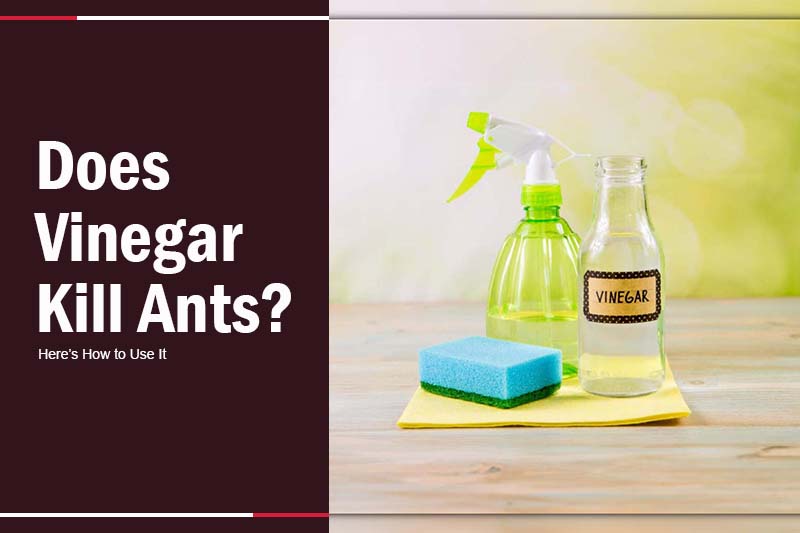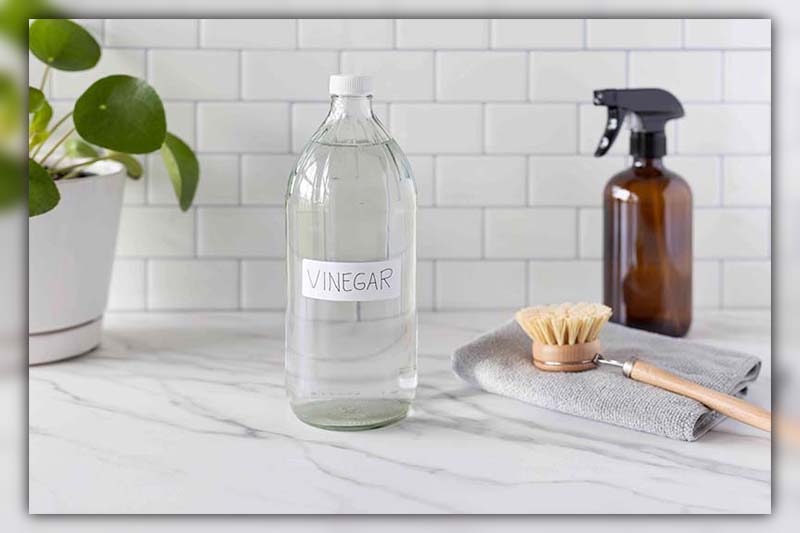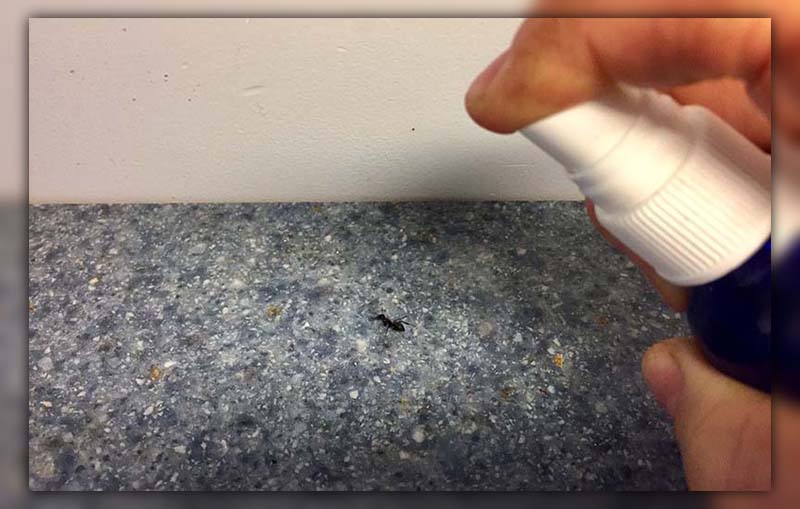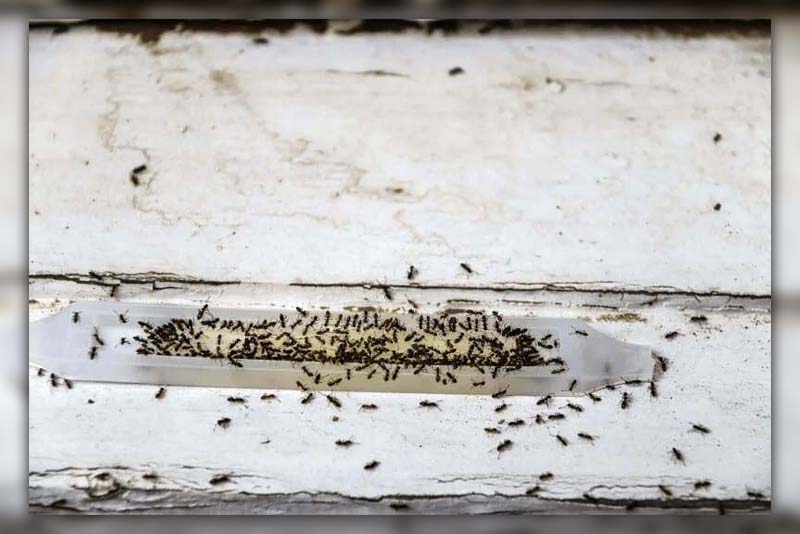In this article, you will learn the answer to the question “Does vinegar kill ants?” and the best ways to use vinegar as an ant killer and repellent.

1. Does Vinegar Kill Ants?
Yes, vinegar can be an effective ant killer. The acetic acid in vinegar disrupts the ants’ sensory signals and damages their exoskeleton, leading to dehydration and ultimately causing their demise.

2. How to use Vinegar to get rid of Ants quickly?
Now that we know vinegar’s ant-fighting capabilities let’s dive into some effective ways to utilize it against these miniature invaders:
1. Use a DIY vinegar spray to repel Ants
Creating your DIY vinegar spray is a breeze. Grab an empty spray bottle, fill it with equal parts of water and vinegar, and give it a good shake. Spray the mixture along the ant trails, entry points, and any areas where you’ve spotted these little critters.
The acetic acid will work its magic, and the ants will steer clear of those areas.
2. Use Vinegar-Soaked cotton balls to repel Ants
For a more targeted approach, soak cotton balls in undiluted vinegar and place them near ant-infested zones or entryways.
The ants won’t appreciate the aroma, and they’ll think twice about setting up camp in your home.
3. Use Essential Oils To Repel Ants
Enhance the ant-repelling power of vinegar by adding a few drops of essential oils like peppermint, lemon, or tea tree oil.
These oils not only enhance the scent but also have properties that ants can’t stand.
Mix the essential oil of your choice with vinegar, and follow the same spraying or cotton ball technique as mentioned earlier.

3. How long does it take Vinegar to kill Ants?
Pure white vinegar swiftly eliminates ants by blocking their breathing pores, inducing serious burns and discomfort in their outer layers due to its acidic nature.
If the ants don’t succumb immediately, it generally takes 5-10 minutes for the vinegar to prove fatal to them.
4. 5 Effective Ways to Kill Ants That You Should Use Instead of Vinegar
While vinegar can be a handy natural remedy for dealing with ants, there are other effective methods worth exploring.
Here are five alternatives that can help you combat ant invasions with ease:
1. Ant Spray
Commercial ant sprays are readily available and can be a potent weapon against these tiny invaders. Look for sprays specifically formulated to target ants and follow the instructions on the label.
2. Diatomaceous Earth
Although harmless to humans and pets, its fine particles are lethal to ants. When ants come into contact with diatomaceous earth, it dehydrates their exoskeleton, leading to their demise.
Simply sprinkle the powder in ant-infested areas, and let nature take its course.
3. Ant Baits
Ant baits are an ingenious way to eliminate entire ant colonies. These baits consist of attractive ant food mixed with a slow-acting insecticide.
The foraging ants will carry the bait back to their nest, sharing it with their colony members, and eventually wiping out the entire population.
4. Ant Gel
Ant gels are similar to ant baits but come in a gel form, making them easier to apply in hard-to-reach areas or areas where traditional baits might not be suitable.
The gel acts as a tasty treat for the ants, and as they consume it and take it back to the colony, the population meets its demise.
5. Granulated Ant Poison
Granulated ant poison is another option for combatting ant infestations. Sprinkle the granules in areas frequented by ants, and they’ll pick up the poisonous particles as they roam around.
These granules can be highly effective, but it’s essential to keep them out of reach of pets and children.
FAQs
Is Vinegar Safe for eliminating Carpenter Ants at Home?
While vinegar can be used as a deterrent for common household ants, it may not be the most effective method for dealing with carpenter ants.
Does Vinegar disrupt ant trails?
Yes, vinegar does disrupt ant trails. The strong scent of vinegar interferes with ants’ ability to communicate through pheromones, which are chemical signals they leave behind to guide other ants to food sources.
Can White vinegar destroy an Ant hill?
The acetic acid in vinegar disrupts the ants’ sensory signals and damages their exoskeleton, leading to dehydration and death.
However, you need to use a lot of vinegar to saturate the ant hill and reach the bottom of the tunnels.
Will Vinegar and dish soap kill ants?
Yes, vinegar and dish soap can kill ants. The solution can help in clearing both indoor and outdoor infestations.
Does apple cider vinegar kill ants?
Apple cider vinegar does not kill ants, but it can repel them by masking their pheromone trails and disrupting their communication.
Conclusion
Vinegar kill ants and keep them away from your home. Vinegar is a natural and cheap solution that works by disrupting the ants’ pheromone trail and destroying their exoskeletons.
We hope you found this blog post helpful and informative. For more pest control tips and tricks, visit our website at Pestweek.

Calina Mabel has over 15 years of experience in the field of journalism and communications. Currently, Calina Mabel is the Content Writer for categories such as Cockroach, Ants, Bed Bugs, Mosquito, Rodent, Termite, and Flies on Pestweek.com. She aims to build content for these categories with a focus on providing valuable and accessible information to readers, in order to create the world’s largest knowledge community about Pests.
All content written by Calina Mabel has been reviewed by Emily Carter.


